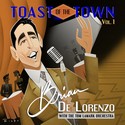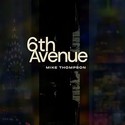|
Three albums featuring mainly mid-20th century standards are on the Sound Advice playlist this time. Australian singer Michelle Nicolle's 11th release is her first without the three musicians who have been on those past projects, choosing instead to have guitarist Larry Koonse as her sole accompanist. The other two recordings here boast big bands. We have vocalist Brian De Lorenzo with a big band, and then an instrumental outing by a big band (with one guest vocal) showcasing conductor/arranger/producer Mike Thompson. Both men hail from the Boston area, where their albums were recorded, and each one's set list includes two classics written by Cole Porter. All three items reviewed here make room for the 1939 gem that was the one most frequently named in a 1964 survey asking prominent theatre composers and lyricists to list a few songs they most admired: "All the Things You Are" by Jerome Kern and Oscar Hammerstein.
 MICHELLE NICOLLE MICHELLE NICOLLE
with LARRY KOONSE (guitar)
THE SILENT WISH
Purple Lead Music
CD | Digital
"All the Things You Are" placed in the voice of Michelle Nicolle and the fingers of guitarist Larry Koonse presents some of all the things they are doing to be creative and commanding as they personalize standards on their sublime duo album. There's a languid start, an a capella line, some tempo changes, blending one phrase of a lyric into another, a swath of skillful scat-singing, and ending the track by repeating the first line of the chorus. The title of their satisfying release, The Silent Wish, references what, in her liner notes, the singer calls "the most moving line in a song, ever." It's from the Marilyn and Alan Bergman lyric heard in the final track, "What Are You Doing the Rest of Your Life?" ("And when you stand before the candles on a cake/ Oh, let me hear the silent wish you make"). In a minimalist mode, the artists stay true to and honor the piece's pensive, tender words and Michel Legrand's artful melody.
Whether the choice is to take lots of liberties, deftly decorating the architecture of a song, or to present a strikingly stripped-down version of a ballad to highlight its vulnerability, there's chemistry and an "ownership" that makes things seem right. Spun in seamlessly smooth lines, Michelle Nicolle's timbre is captivating, with richly resonant low notes and disarmingly delicate head tones. Larry Koonse's playing is spare, rather than splashy. It often feels like a conversation with the words and moods of the vocalist, as his mid-song solo passages continue and expand what they've established. Experience shows; she performs live regularly and has been releasing albums since the late 1990s; and his website states that, in addition to live gigs, he's played on over 400 recordings!
Intriguingly, a listener is pulled into each song immediately because several have "cold opens"–not having even a couple of strums or phrases from the instrumentalist before the singing starts. Others have a brief but exquisite bit of melody on guitar to economically and emotionally set the stage. Then, the stories and perspectives of some of the standards get special attention when the introductory verses are preserved. This is the fortuitous fact with the haunting sorrow of "When Your Lover Has Gone" as well as the strong appreciation for a loved one expressed in three numbers: "All the Things You Are," "I'm Glad There Is You (In This World of Ordinary People)," and "With a Song in My Heart." However, there are some choices made with "With a Song in My Heart"'s lyric that can be distracting to the purist: a few individual words in the chorus replaced by semi-synonyms and the original first verse of this Rodgers & Hart classic is absent, replaced by what had been a mid-song verse (same music, different words) as the intro.
In addition to the eight standards that fans of the Great American Songbook know well, the program has two solid numbers by writers from "down under": New Zealander Tim Finn's 1980 song, "I Hope I Never," about the pain of a break-up and wanting no more contact; and an ear-tickling, jazzy contribution by the Australia-based lady who is this album's vibrant vocalist. Its title is "Putting It Off." If the well-matched Silent Wish partners wish to record another duo set, I hope they won't be "putting it off" for very long. Encore, please!
 BRIAN DE LORENZO BRIAN DE LORENZO
with THE TOM LAMARK ORCHESTRA
TOAST OF THE TOWN, VOL. 1
CD | Digital
Nostalgic, romantic, buoyant, sincere, and solid: that's what you get with singer Brian De Lorenzo and his new album. While three of four tracks that find the confident cabaret veteran accompanied by just a small group of musicians permit some serious and sad stuff, it's primarily perky and upbeat, set to the beat of a big band's caffeinated kick. There are plenty of fine old songs and there's fine musicianship on Toast of the Town, Vol. 1. (As the title indicates, there's more where that came from; the second volume has already been recorded and is expected to come out next year.) The well-crafted arrangements are by fellow Bostonian Tom LaMark, who is also the pianist and music director.
While the majority of the ingredients in this recipe for evoking the sound of the big band era of the 1930s and '40s are not songs from those decades, they get some of the musical sensibilities of the era. However, the arrangements don't follow the pattern of those times in having a long instrumental section first with the lyric only coming in later, listed on record labels as a "vocal refrain." Two numbers that are genuine souvenirs of the repertoire of one of the period's most popular outfits, the Glenn Miller Orchestra, are sung: "(I Got a Gal in) Kalamazoo" and the cheery "Chattanooga Choo Choo." Both are in what's billed as a "Travel Medley," but the album's selections also reference other locations: a city in California ("The Lady from 29 Palms") and the capital cities of Italy ("Autumn in Rome") and France ("I Love Paris," Cole Porter's ode to that place). Another Porter standard, "You'd Be So Nice to Come Home to" finds a home in the aforementioned medley.
Some of the most noteworthy notes come at the ends of tracks with either splendidly robust sustained notes or super-lovely pure, high tones. In both cases, control is impressive and the sounds are rewarding. Another gratifying plus is that some renditions include the original introductory verses that many singers drop. Mr. De Lorenzo lavishes attention and affection on those neglected but worthy set-ups to "My Foolish Heart," "I Love Paris," "Too Close for Comfort" (an especially obscure verse), and "All the Things You Are." That last-named standard from Jerome Kern's last musical for Broadway, Very Warm for May, is most often treated as a formal and/or worshipful ballad, but after investing the verse with some unrushed but ardent earnestness, Messrs. DeLorenzo and LaMark jump into jauntiness, swinging the standard at a surprisingly brisk clip.
The singer's voice soars on the bright-tempoed tracks. They have vigor. When things slow down, vibrato is in full evidence, especially with two pieces about memories of love cued by the same season of the year: "Autumn in Rome" and the lamenting "Autumn Leaves." The two are combined in a medley and cello comes in for elegance and potent gravitas. The actual autumn for Brian De Lorenzo will mean attention on a show centered on songs Frank Sinatra and Sammy Davis, Jr. performed in their Las Vegas engagements. So far, it's booked in Rhode Island on the last night of September in West Warwick, the town where the Toast of the Town singer will toast those two legends.
 MIKE THOMPSON (Bandleader) MIKE THOMPSON (Bandleader)
6th AVENUE
CD | Digital
With lots of energy, the big band jazz arrangements played under the direction of conductor Mike Thompson make for a bold and exciting debut album. A few of his own engaging compositions are mixed in with impressive treatments of familiar classics that are all far older than he is. (He's 26; he's also the producer.) Titled 6th Avenue after one of the numbers he composed, the program has a lot of punch and polish with stylings that build well and offer variety as various instrumentalists get brief or prolonged time to solo within one track. Most prominently in the spotlight are: Brian Watson, one of four trumpeters (on a driving "All the Things You Are" and the title cut); Mike Caudill, one of four reed players (on the other originals); and pianist Mark Shilansky.
There's only one vocal, but it's a doozy. Taking on Cole Porter's "Let's Do It (Let's Fall in Love)" with gusto, guest Charlize Vermaak zooms through it with delicious directness, eschewing the deliberately coy, winking way others sing the list song about all kinds of people and other living creatures finding mates. The no-nonsense, assertive approach is refreshing. The album's other Porter pick is a pick-me-up, too, as the pianist and bandmates charge through the title tune of the musical Anything Goes.
While the program is mostly red-hot romps, it's not relentlessly so. Some arrangements simmer at first, the Thompson-composed "Parisian Deception" has some tension and drama, and there's lilting sweetness in "Someday My Prince Will Come" with the sound of guest Sarpay Özçağatay's flute floating through the air.
In an interview, Mike Thompson was asked what kind of repertoire he's considering for his next jazz album and he replied that he's considering tackling the songs of Stephen Sondheim. I'd like to hear this resourceful fellow's take on that oeuvre. Meanwhile, I've enjoyed traveling along 6th Avenue.
|
|